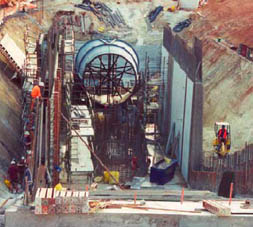 |
 |
|
Putting the "River" into Riverina
Hume Dam, near Albury, first began controlling flows into the Murray River in 1925. With the regulation of the Murray now possible the NSW Water Conservation and Irrigation Commission began plans for irrigationin the Southern Riverina. In addition to the Wakool Irrigation District, fed from the Edward River, the WC&IC approved the further development of the Berriquin and Deniboota Irrigation Districts. These new districts required the construction of a major irrigation channel, their own “man-made river” known as the Mulwala Canal. The canal draws its water from the Murray River at Lake Mulwala and stretches 156km to the west through Berrigan, Finley and Deniliquin. Construction of the Mulwala Canal and Yarrawonga Weir began in 1935. Both projects provided significant employment relief during the Depression. More than 500 men, employed labourers and contractors, were working on the Mulwala Canal at any one time when construction was in full swing. Four imported 130 ton Bucyrus Erie dragline excavators worked in shifts 24 hours a day on the Mulwala, excavating up to a mile a week. By 1939 Yarrawonga Weir was completed, and the Mulwala Canal and many associated branch channels had been completed as far as Finley. The first water in the Berriquin District was officially delivered in April 1939, with NSW Premier Alex Mair conducting the official opening on a farm east of Finley. |
The Power of Water
The Mulwala Canal is the largest irrigation supply channel in Australia. Its initial capacity of 10,000ML a day rivals some reaches of the Murray River itself. The energy generated by the water in the canal has been harnessed through the construction of a 2.5 megawatt hydro electric plant on the canal at The Drop between Berrigan and Finley. The hydro plant, pictured above under construction in 2002, can produce enough green power for about 1500 homes. Photo: MIL Collection. |
|
| sitemap • credits
& references • copyright • local
history links • contact & contribute • VISITORS |
||

